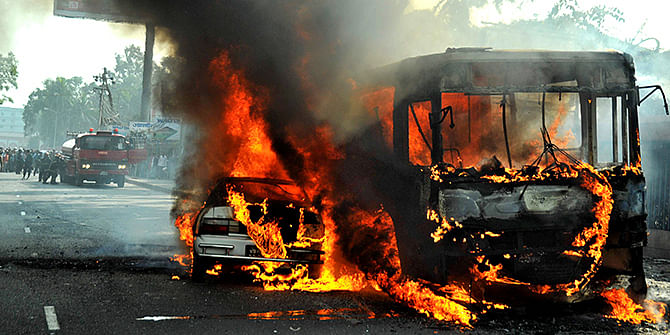Playing with fire

The current conflict can be traced back to last year's elections, mainly because most of the political parties -- not only BNP and its allies but also CPB, Gono Forum -- boycotted the elections. They did not accept the formula of January 5 elections that AL tried to sell. AL felt that it might not do well in an all-party election under the caretaker system. Earlier, when BNP was in power, it realised it wasn't going to do well unless it manipulated the caretaker system, which it tried to do by raising the age limit of the chief justice, among other measures. Whichever party is in power -- whether AL or BNP -- is not interested in a free and fair election because it knows that the result won't go in its favour.
In the present context, the opposition BNP thinks that if there is an election it will do well. AL and BNP each have 25% core supporters. And there are 30% voters who swing in their loyalty. BNP is confident that it will get a big chunk of the swing vote in an all-party election. But at the same time it knows that there won't be mass demonstrations for bringing an end to this deadlock or to push the government out. The only option BNP has is oborodh.
As there is no mass movement, the ruling party sees no reason why it should give in to BNP's demand for an all-party election. So it has made it into a law and order issue. The violence benefits the ruling party because it can say: “Look, this (BNP) is a militant, terrorist organisation.” I think we may be falling into the trap of state terrorism. That is not going to solve the problem. We have also seen this indulgence in state terrorism by some ruling party members and some government officials.
State terrorism has always been part of counter-terrorism. In many countries we have seen that in dealing with counter-terrorism, state terrorism becomes a principal instrument. Israel would be a very good but extreme example. In Pakistan and even in India -- when it comes to Kashmir -- we have seen that when they deal with counter-terrorism they indulge in state terrorism. But this approach can stop it for a few months or years but unless the basic problem is solved it will come back. It has come back in Kashmir. I see no difference in the case of Bangladesh.
In the ongoing violence we are seeing overwhelming presence of youth, which is not a good indication. Once the youth start hurling bombs, you create a structure that will be very difficult to contain later. As a Russian author once said: “Once you introduce a gun in the narrative, the gun will be used.” Since you are introducing violence, re-educating the youth and making them relearn will be hard.
So in our present crisis, a change of power won't change anything because the ruling party will manipulate elections. No matter who is involved in this violence, today or tomorrow the parties have to come to the people. They cannot recreate January 5 again and again and again. They have to come to the people. So what is required is not only a political charter but also a social charter so that people don't suffer. It is not going to solve all problems but we will be one step ahead to achieving democracy, and I believe the current situation will be contained.
In the social charter, we need an understanding not only between the two major political parties but also between the political parties and the people. Parties need to trust the people and say we will go back to you; we trust you; in the meantime we will not fight, which will kill you or hurt you. In that way, they can re-educate people in a democratic society.
Civil society has also an important role to play here. Not all of them might agree to it. But what the civil society can do is to come up with a decision together or with a better charter to break this deadlock.
Some think civil society should have a political party. That is a wrong understanding. Civil society is supposed to be multi-layered. A civil society is one where you have dissent, contradictions, varied opinions, etc. Out of the contest between these opinions, something will emerge. Out of the various opinions emerging out of civil society, the political society can take some and leave some.
Lastly, we are seeing that many ruling party members are over-emphasising on development in such way that it seems that democracy and development are two opposite things. It seems as if the ghost of Ayub Khan is still roaming around, because, he was the one who came up with the slogan 'decade of development.'
We cannot negotiate when it comes to democracy. More importantly, the very creation of Bangladesh was for democracy. We are forgetting that. In the 1970 elections AL won, but power was not given to them. A genocide followed, and that led to the birth of Bangladesh. Democracy and the birth of Bangladesh go together.
The commentator is Professor, Department of International Relations, University of Dhaka.

 For all latest news, follow The Daily Star's Google News channel.
For all latest news, follow The Daily Star's Google News channel. 



Comments